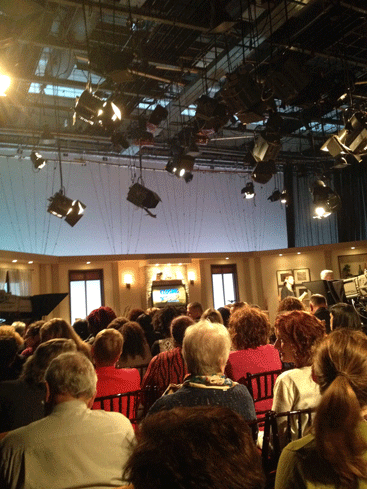It has been fifty years since President John F. Kennedy signed the Equal Pay Act into law and women still make an average of 77 cents for every dollar earned by men. In an attempt to educate and foster change, on Thursday, October 2, WQED Multimedia produced a one-hour talk show in partnership with YWCA Greater Pittsburgh.
Sponsors for the event included the Eden Hall Foundation, Chatham University, and the Mary Hillman Jennings Foundation.
“It is through partnerships with non-profits like YWCA Greater Pittsburgh, and the support of local organizations like Chatham University that WQED is able to ask people to consider complex issues like the wage gap for women,” said Deborah L. Acklin, President and CEO of WQED.
The event, titled “Closing the Gap: 50 Years Seeking Equal Pay,” was hosted by CNBC’s Sharon Epperson and had a panel of national experts representing some of the most famous women’s organizations in the country.
The panel included Terry O’Neill, President of the National Organization for Women (NOW); Linda Hallman, Executive Director and CEO of the American Association of University Women (AAUW); Teresa Younger, CEO of the Ms. Foundation for Women; and Dr. Dara Richardson-Heron, CEO of the YWCA-USA.
A special guest for the event was Lilly Ledbetter, namesake of the 2009 Fair Pay Act.
The show premiered live at 8 p.m. and was also available to stream online for free through a multiplatform application from PBS called “OVEE.” Ayana Ledford, Founding Executive Director for Progress at Carnegie Mellon University acted as the moderator for any discussions on OVEE.
The event began with a VIP reception at 6 p.m. in the WQED studios, giving guests a chance to mingle and network. Although it was a “VIP” event, both rooms being used for the reception were packed to the max with eager guests awaiting the show.
Around 7:15 p.m., guests were ushered into the studio where the program was to be filmed and heard a welcoming speech from Esther Barazzone, President of Chatham University.
On the topic of equal pay, Barazzone said, “How can it not be important?”
“We at Chatham are very pleased to be part of the sponsors this evening, and it is the new Women’s Institute of Chatham University that is sponsoring this program,” Barazzone said. “As we go fully coeducational next fall, we honor our heritage and we preserve our expertise—but we intend to expand it.”
The hour-long program featured discussion between the panelists, questions from the audience, a special interview with Lilly Ledbetter, and intermittent additional videos focusing on specific topics relating to equal pay.
Some of the issues raised included Education, Industry, and Career Choices; Asking for What You’re Worth: Do Women Know How to Negotiate; Driving Public Policy and Advancing Legislation for Equal Pay; Industry Segregation: The Over Representation of Women in Low-Wage Jobs; How a Lifetime of Pay Inequality Affects Women When They Retire; The Impact of the Wage Gap on Women of Color and Their Families; and Work-Life Balance.
According to the National Partnership for Women and Families, the wage gap has only improved at a rate of less than half a cent per year since the Equal Pay Act was signed into law. If this rate continues, the wage gap will not close until the year 2053.
This program was just a single part of a two-year campaign geared towards educating and empowering communities. Later on it will even include a series of skill-building webinars. More information can be found at wqed.org/closingthegap and womenswagegap.org.


